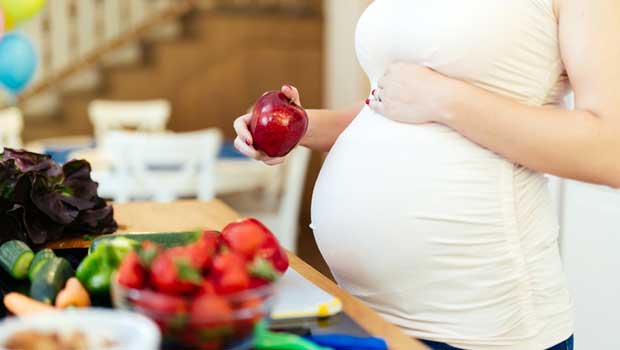
Eating a balanced diet should be the goal of every individual in order to maintain good health. During pregnancy, this should become a priority in order to ensure healthy development of the fetus as well as well-being of the mother. Although good dietary practices should see no season; in monsoon specifically, one must be more cautious about intake of food and drinks. Pregnant women in particular should choose foods carefully that are nutritious yet light on the stomach, as monsoon brings along several gastrointestinal disturbances.
During monsoon, the damp weather along with a favourable temperature for growth of pathogenic organisms leads to infections and allergies. These infections can be attributed to increased humidity and a suppressed immune system. Pregnant women are vulnerable to such problems considering their fluctuating hormone levels throughout pregnancy. Bacteria, viruses, or parasites can cause infections in pregnant women that can be transmitted through contaminated or stale food and water. Therefore, following a proper diet regimen and maintaining good hygiene in terms of food intake and preparation can help in preventing pregnant woman from contracting illnesses during monsoon.

Pregnant women tend to crave for specific foods at odd hours of the day.
Follow These Simple Diet Tips To Ensure A Healthy Pregnancy:
- Do not rush to your local street food vendor when you have a craving: This is of foremost importance. Pregnant women tend to crave for specific foods at odd hours of the day. Remember that street foods may not be prepared in a hygienic manner that could be harmful to both mother and child. Typhoid, cholera etc. tend to spread through contaminated food and water. It would be best if someone could prepare the dishes you crave at home, or at least look out for restaurants with good standards of hygiene.
- Only consume cooked vegetables: While you may like to chew on raw carrots, cucumbers or even onions, in monsoon, it is best to avoid eating vegetables without cooking. This is because bacteria may thrive on unclean vegetables. Particularly, vegetables that have been lying outside for a long time tend to absorb moisture from air and allow for breeding of microorganisms. Any health disturbance cause by consumption of such vegetables could lead to impaired development of the foetus, especially in early stages.
- You may have heard that greens are good for your baby. However, during monsoon, it would be wise to avoid leafy vegetables, which may be contaminated with worms, mud, and get stale faster. Stay away from raw salads that contain lettuce and field greens for the same reason. If you do feel like consuming these, wash them thoroughly in salt water.
- Avoid consuming cooked dishes that have been stored in the refrigerator. Always eat fresh dishes.
- Drink warm soups. You can have boiled/steamed salads. Check on the internet for interesting recipes!

Avoid having fruit juices from roadside stalls.
- Avoid cut fruits too! Stay away from those stalls that serve cut fruits/fruit chaat. Ideally, you should also not consume fruit juices from stalls either. Buy fruits; wash them thoroughly before eating at home. Make sure you do not store left over fruit. Bacteria grow on cut fruits and enzymatic degradation also begins, which results in loss of nutrients from the fruit.
- Keep your immune system healthy by consuming vitamin C-rich fruits like oranges, kiwi, sweet lime etc. You may not feel like consuming certain fruits that have a strong smell; for example, jackfruit. Talk to your doctor about fruits that are good for you, while keeping in mind your aversions.
- Stay hydrated: Humidity during monsoon is high and less intake of water will interfere with proper flushing of toxins from the body. We understand that you may not feel thirsty because of the lower temperatures this season. Nonetheless, the 6-8 glasses of water a day rule stands. You can also increase fluid intake through fresh fruit juices, coconut water etc., which will additionally provide electrolytes, vitamins, and minerals.
- Think twice before eating meats: Microorganisms tend to thrive more on non-vegetarian foods (it is dead flesh after all!). We all may have seen how poultry, sea food, and other meats are stored. In monsoons, there is a risk of transmission of vector-borne diseases through these. Proper freezing of meat is paramount to prevent breeding of microorganisms. Thus, make sure that you only buy fresh meats/sea food and clean them thoroughly before cooking. Do not even think of consuming raw meat in any form. Throw away left-overs and do not continue eating if you feel the taste is off. You could look on the internet on the cooking styles – roasting/barbecuing seems a good option.
- Avoid sour foods: Yes, you love pickles and tamarind when you are pregnant. But these can lead to water retention. Limit intake of such food items.
- Increase intake of herbs: As Indians, our mothers and grandmothers have ample of home recipes for cold, cough, digestion etc. While most concoctions are bitter in taste, include these as a part of your daily routine to keep infections at bay.

Limit intake of sour food items.
- Say no to fried and starchy foods: These are heavy to digest, thus when consumed in large quantities, although tasty, may lead to indigestion. Fried and overcooked foods lose their digestive efficacy, so make sure you limit such intake.
- You should also eat foods (or in certain cases supplements) to ensure that you receive your daily requirement of antioxidants, vitamin A, C, E, zinc, selenium, as well as B6, B12, and folic acid.
If possible, after talking to your gynaecologist, consult a dietitian, who will help you choose the right foods that will help you stay healthy during pregnancy. Always remember that during pregnancy and lactation, what you eat is the only source of nutrition to your child. Therefore, there should be no compromise in the quality of foods you consume to ensure that both you and your baby are healthy.
About Author: Dr. Sapna Chaudhari (Jain) is a consultant, obstetrics and gynaecologist at Motherhood Hospital, Kharghar, Mumbai.
Disclaimer: The opinions expressed within this article are the personal opinions of the author. NDTV is not responsible for the accuracy, completeness, suitability, or validity of any information on this article. All information is provided on an as-is basis. The information, facts or opinions appearing in the article do not reflect the views of NDTV and NDTV does not assume any responsibility or liability for the same.
[“source=ndtv”]



















